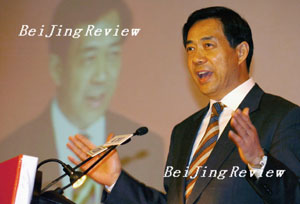
The Doha Round of global trade talks was suspended in July, but that is not the end of the story. While there have been a lot of fingers pointing over the causes of the breakdown, debates on different aspects of the World Trade Organization (WTO) talks have gained force.
At the same time, a flurry of diplomacy has taken place for the resumption of the Doha Round. Bilateral talks on this subject have been held around the globe. Multilateral meetings of stakeholders have occurred in Brazil and Singapore, and relevant nations are scheduled to meet again in Geneva soon.
Amid these efforts, the possibility of a resumption of the stalled talks is growing.
"The Doha Round of negotiations is like a boat. It is stranded on the beach. But it is sure to set sail," said Zhou Shijian, the Standing Councilor of the China Society for World Trade Organization Studies.
His comments were echoed by Brazil's Foreign Minister, Celso Amorim, on September 10 in Rio de Janeiro, when he said the Doha Round is like a patient who has been released from the intensive care unit but is still confined in the hospital for a while.
The Doha Round of trade talks, which began in 2001, was named after the Qatari capital where the talks were launched. With an avowed aim to lift millions out of poverty through fairer trading conditions, the round has been billed as the "development round" of WTO talks, as well as a once-in-a-generation chance to boost global economic growth.
However, on July 27, WTO Director General Pascal Lamy declared a halt to the five-year-old talks after the parties failed to achieve substantial progress. Lamy said he would consider resuming the talks after all participants showed sufficient sincerity.
On September 9-10, international trade officials from the Group of 20 (G-20) developing nations met in Rio de Janeiro for the first time since the Doha Round was suspended, with the aim of developing a unified position.
What happened in July was "a serious accident," said Lamy at a press conference at the close of the G-20 meeting, but "we have been able to move ahead in Rio de Janeiro." He said all the parties at the Rio meeting agreed that negotiations should resume.
"By mid-March of next year we have to get to know if there is a deal in the making or not," Lamy said, though a definite date for formal negotiations was not set at the meeting.
Why Doha failed
"The Doha talks will be revived by the end of the year and last for one or two years, or even more," Zhou predicted in an interview with Beijing Review. "Anyway, the [previous] Uruguay Round took seven years."
Jeffrey J. Schott, Senior Fellow at the Institute for International Economics in Washington, D.C., explained the reason why the Doha Round failed. "Disagreements over agricultural reforms—in particular, how much the United States and the European Union (EU) should cut subsidies and tariffs protecting their farmers—have been a major cause of the impasse in the Doha Round," he told Beijing Review.
Chinese experts on the WTO tend to attribute the collapse of the Doha Round to developed countries' neglecting the interests of developing countries.
"The developed world and the developing world failed to agree with each other, while in the developed world, different countries cannot reach a consensus," said Zhou. "For example, the EU just cannot compete with the United States in terms of cutting government subsidies."
That may partly explain why EU Trade Commissioner Peter Mandelson once had scathing criticism of the United States. "The United States has been asking too much from others in exchange for doing too little themselves," he said in July.
He said Washington was responsible for the failure of the WTO talks and warned of negative consequences in global trade, particularly for poor nations.
But there are other views. Daniel Esty, Director of the Yale World Fellows Program, said the biggest obstacle to a successful conclusion of the Doha Round is the EU's intransigence in reducing its trade-disruptive agricultural subsidies, which blocks access to the European market for many developing nations with potential agricultural export sectors.
"The slow pace at which the EU is proposing to reduce these subsidies, which amount to tens of billions of euros each year, is the major stumbling block to progress. And within Europe, the finger of blame must be pointed directly at France for its refusal to make adequate concessions on farm subsidies."
Esty also criticized several Asian nations. "Japan and South Korea are also part of the foot-dragging group."
"The developing countries were angry, as the developed ones always carry out a 'double standard' in world trade," said Zhou. "Industrialized countries, which dominated the trade talks, are very selective about which sectors should be pro-free-trade. For products they are not good at [manufacturing], for example, textiles, they impose not only tariffs, but also quotas. For IT products, in which they have a competitive edge, there is no tariff at all."
Getting the talks restarted
Zhou said that mentality is not good for world trade. "The United States and the EU are both trade giants. If the Doha Round collapses eventually, where will the WTO head? Without the WTO, the globalization of the economy cannot be achieved," he said.
On the relationship between the Doha talks and world trade, Morgan Stanley Chief Economist Stephen Roach has a different viewpoint. In his article titled "Doha Doesn't Matter," Roach writes that the Doha Round was "a sideshow to the main event in the global economy" from the very beginning.
"A successful completion of the Doha Round of trade liberalization would have been nice. But the benefits would have been fleeting, at best. There are much bigger fish to fry in an increasingly contentious era of globalization," he said.
However, Roach's comment does not seem to be in the mainstream. As the third quarter of the year comes to a close, more voices are heard appealing for the resumption of the WTO negotiations, and stressing the importance of the Doha Round to the establishment of a stable and open global economic system.
"A failure of Doha would strengthen those who want to turn their backs on globalization and retreat into protectionism. It would undermine the WTO system, which has brought stability and predictability to the global economy," Mandelson said.
In Rio de Janeiro, U.S. Trade Representative Susan Schwab said the United States "is committed to finding a successful outcome for this round if there is one to be found."
"The WTO and its members need a solid Doha outcome to remain an effective force in the global trading system," she said.
But it requires extra efforts on the part of developed and developing countries alike, she said, cautioning that expecting immediate results was not realistic.
Mandelson said high-level talks to jumpstart the Doha Round could be possible at the end of this year or early next year.
International Monetary Fund (IMF) Managing Director Rodrigo Rato and World Bank President Paul Wolfowitz, speaking at the annual meeting of the two international organizations in Singapore on September 19, said all countries should seize the opportunity and re-energize the Doha talks.
Who will take the first step?
Other finance officials expressed their optimism that a swift conclusion to the Doha Round talks could be reached soon.
Gordon Brown, British Chancellor of the Exchequer, gave the most positive statement, saying, "The aid-for-trade announcement, the determination of America, the statements made by European ministers, the communique that says we want a successful outcome by the end of the year show that we are fired up as a group in wanting both a conclusion to the trade round and a successful outcome, and I believe that is sending a message right across the world."
Despite the optimistic talk, the problem remains of who will take the first step. In her trip to Beijing in late August, Schwab used the "rock-paper-scissors" game to describe the importance of simultaneous action by all players. Otherwise, she warned, "One cannot play the game."
"Therein lies the key challenge for WTO diplomats," Schott told Beijing Review. "The United States, the EU, Japan and others will have to offer reforms of restrictions that have survived liberalization initiatives over the past 50 years.
"To get political support for changes in their long-standing trade barriers, trade officials from those countries will need to bring home agreements that offer substantial new trading opportunities in agriculture, manufacturing and services. Simply put, a big package of market access reforms is essential for a successful Doha Round deal.
"Thus, the leading developed and developing trading nations need to act in tandem to improve what is on offer in the Doha Round," said Schott.
China maintains that developed nations are expected to "take the lead in making substantial concessions" in terms of cutting farm tariffs and subsidies. In his meeting with Schwab, Chinese Commerce Minister Bo Xilai said, "We hope the developed WTO member countries will make substantial contributions in order to resume the talks as soon as possible and reach the objectives of the negotiations in a timely manner."
These countries account for the lion's share of world trade and represent a wide range of commercial interests. Consensus among them is considered crucial for a general agreement of all WTO members.
"The developed countries must act first," said Zhou of the China Society for World Trade Organization Studies. "On the one hand, they must cut agricultural subsidies by a large margin. On the other hand, they must give a clear timetable. They can learn from what has been done in regard to textiles."
He said it is difficult to reach a consensus among 149 members, but somehow a solution will finally be reached. "Nobody can shoulder the responsibility for the failure of the WTO talks."
(Wang Yanjuan and Chen Wen contributed reporting for this article from New York)
| 